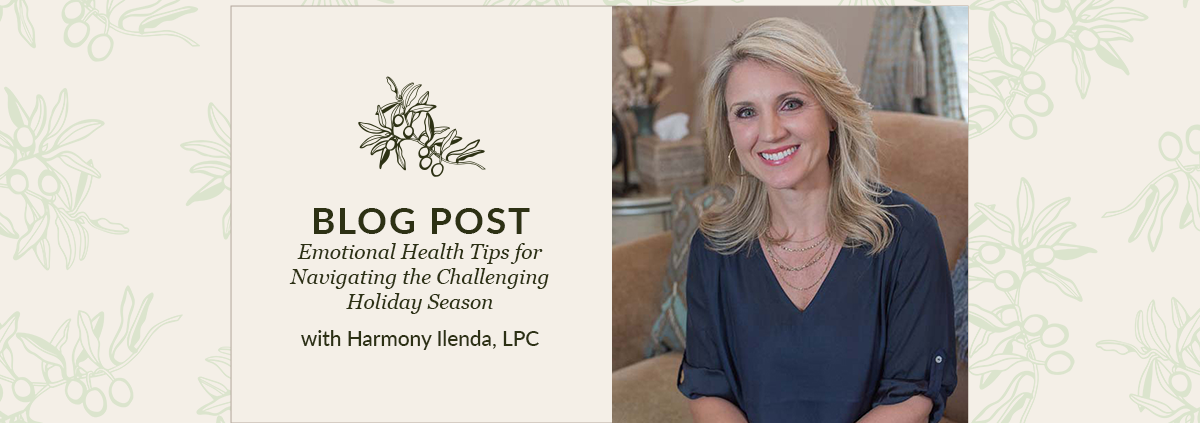Emotional Health Tips for Navigating the Challenging Holiday Season
Emotional Health Tips for Navigating the Challenging Holiday Season
An Interview with Harmony Ilenda, Licensed Professional Counselor, Roswell, GA
The holidays are a complicated and chaotic time, and for many people, this time of year can be bittersweet, or just downright hard. With the added stress and anxiety that comes with this season, it’s so important that we take care of our mental and emotional health.
We sat down with Licensed Professional Counselor Harmony Ilenda to discuss some emotional health tips for navigating the season when it doesn’t feel so merry and bright. Harmony takes a faith-based approach to counseling, and she sees individuals, couples, teens, and families from our Roswell office.
In your experience, how do the holidays impact our mental and emotional wellness?
The holidays impact our mental and emotional wellness in many ways, both positive and negative. On the positive side, the fun and familiar rituals of the season have a beneficial impact on our wellness. Spending time with people we love is so important. Also, giving gifts and donating time and money to charities is life-giving to our souls.
Unfortunately, there can also be challenging aspects of this season. For anyone who’s experienced a loss, such as a death or divorce, the holidays can feel taxing as memories of their loved one, or memories of how the festivities used to look, fill their minds.
The holidays are always a busy and stressful time, but why does it seem like this season, as we near the 2-year mark of the pandemic, it feels even more taxing on our mental and emotional health?
I believe we have a memory or experience of what the holidays used to be with a great deal of nostalgia, and most of us missed out on the holidays last year, so it feels like a loss. For some people, they may be disappointed by what the holidays look like compared to how they “should” be.
In either case, when the holidays don’t look or feel like our expectations, it can feel taxing on our mental health. Covid changed the rules for what it means to spend time with others down to even how we greet one another. With the loss of handshakes and hugs, and social distancing, people are uncertain how to physically be in each other’s space. Even as things get “back to normal,” our nervous systems retain that anxiety over being close to others not in our immediate families.
In addition, there is always an underlying concern of contracting covid when we are spending time with others. As we all know, there is disagreement among communities over whether or not to vaccinate. If you are spending time with family or friends this holiday season that feel differently than you on this matter, it can feel confusing and conflicting, which again takes a toll on one’s emotional health.
Strained family dynamics can add to the stress of the holiday season. How can we set healthy boundaries with loved ones in order to protect our mind, body, and spirit this year?
I believe there are three main factors to keep in mind when it comes to setting healthy boundaries. These points can always apply, but can be particularly beneficial during the holidays.
First, identify and define the boundary. Do you know what you want your time to look like? How does this year need to look and feel different? Try to define your boundary less by what you don’t want, and more by what you do want.
Second, communicate your boundary to the person. Do this in a non-defensive and matter-of-fact way.
Finally (and this is the hardest part), hold the boundary. You will probably have to repeat it to them when they ignore, disregard, or try to push past your boundary. This is where it’s helpful to calmly but firmly remind them of the boundary you set, and that you are not compromising it.
Try to keep in mind that boundary setting protects your mind, body, and spirit. It’s actually very kind to set boundaries, as they protect you and others.
What are some other proactive steps we can take to guard our mental and emotional health as we head into the holiday season and our second winter of the pandemic?
It’s pretty common knowledge these days that we are interconnected beings, meaning our hearts, soul, and mind are interconnected. Of course, trouble in one area can mean trouble elsewhere, too. Everyone knows how important it is to take care of our physical health. But, what are we doing to feed our spiritual souls, our minds, and our hearts?
I believe that having daily rituals are vital to our self-care and guarding our emotional health. Examples include reading the Bible and/or a devotional book, meditative breathing, keeping a gratitude journal, and praying. Reaching out to others with a kind word and acts of service are also key. There are apps you can download, such as Headspace, that even remind you to take a pause and breath for a few minutes to settle and invigorate your nervous system each day. However you choose to proactively guard your mental health, do it daily as a practice of prevention.
What are some signs we can look for to alert us that we are struggling mentally and emotionally?
Everyone has feelings and emotions, and they’re not always pretty. But, there’s a big difference between someone having negative thoughts and feelings that come and go, and someone who has persistent and ongoing negative thoughts and feelings. I believe talking to a friend or loved one, or even a therapist can be really helpful. While we will likely continue to have negative thoughts and feelings sometimes, we can get to a point where we can accept them and even work through them to experience more joy and wholeness.
What role can therapy play in helping people remain mentally, emotionally, and spiritually healthy? What are the biggest hurdles keeping people from seeking counseling?
Unfortunately, therapy still holds a stigma for many in our society. I believe therapy can be so helpful. It is so helpful to talk out your feelings and emotions. Oftentimes, people express ideas they didn’t even know they were thinking. A seasoned therapist can help you sort through confusing feelings and emotions, strategize about problem areas in your life, and even set and achieve goals. Therapy can help people recover from past trauma that is prohibiting them from meaningfully moving forward in life. Some people find therapy helpful on an ongoing basis. Others go for a season, usually 6 or so sessions, and then can “check in“ periodically as needed.
Learn more about Harmony’s counseling practice at HarmonysCounseling.com.


